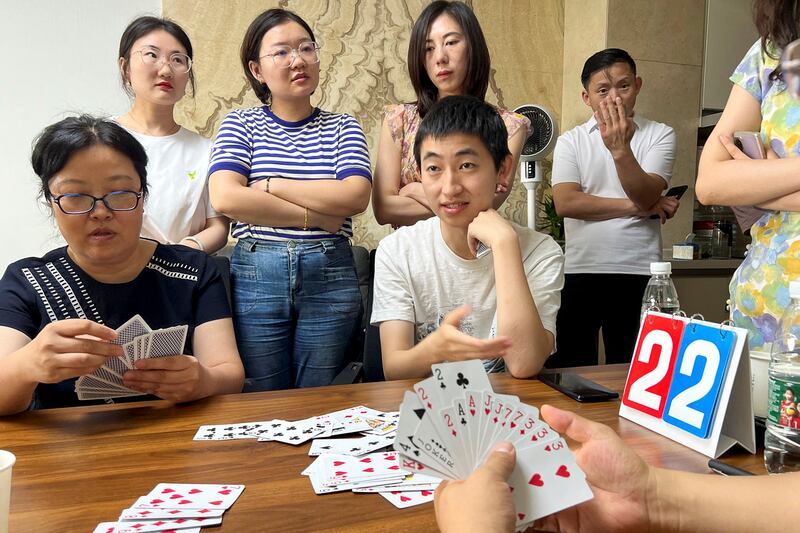State-owned companies and government departments in China are cracking down on a poker-like card game called "Smashing Eggs," or Guandan, that has taken the nation by storm, according to recent media reports.
In the game, four players face off against each other, trying to save different combinations of cards known as "bombs," which sounds similar to "eggs" in Chinese, and slapping down their cards on the table as if smashing eggs.
Originating in the eastern city of Huai'an, it has become hugely popular across the country, with the Chess and Card Center of the General Administration of Sports issuing detailed rules for games and tournaments last year.
But just one year later, the authorities appear to be moving to crack down on the craze, with a number of articles in state media or pro-Beijing press highlighting problems with the game's addictive nature.
"State-owned enterprise personnel told this newspaper that many state-owned enterprises have recently been ordered to ban Guandan in offices, and senior officials aren't allowed to play or organize Guandan-related activities," Hong Kong's pro-Beijing Singtao Daily newspaper reported on Aug. 7.
"[They are] saying that the Guandan craze should be stopped."

The article came after the state-run Beijing Youth Daily newspaper ran two opinion articles on successive days slamming the game as a "poison bullet" because it encourages passive behaviors in young people, a phenomenon fueled by youth unemployment known as " lying flat."
"This trend of everyone lying flat and playing Guandan must be controlled," the paper thundered in an Aug. 6 editorial.
"Lying flat means not striving for progress, not putting up a fight in the face of challenges, not struggling in the face of difficulties," the article said. "This unhealthy trend is already very harmful, and with the popularity of Guandan over the past two years, some people have taken advantage of the situation to lie even flatter."
"In some places, calling friends to play Guandan has become a way of life," the articles said, adding that the game is also wildly popular among ruling Chinese Communist Party and government officials, and in the finance sector.
‘Escapist and decadent’
Reuters reported last year that China's bankers and business executives have taken to playing Guandan in a bid to secure funding for their ventures, due to its popularity among wealthy local government officials in eastern regions.
"Officials like this game, so we play along," investment banker Yang Yiming told the agency in August 2023.
Official media outlet The Paper quoted a university official as saying in a graduation speech recently that the trend was "escapist and decadent," however, and a "manifestation of society's loss of motivation and entrepreneurial spirit."
The Beijing Youth Daily seemed to agree.
"In some places, the addiction to throwing eggs has become a poison bomb that corrodes the work style of cadres, and some party members and cadres are intoxicated by it and cannot extricate themselves," one article warned, adding that some officials are playing the game for "more than 10 hours a week."
"Some units have even formed social barriers so that those who can't play Guandan can't fit in," it said, blaming officials for "lying flat" too.
"For the majority of young people, growth and development in life all depend on hard work and progress, and it can never be achieved by lying down," the paper said.
Current affairs commentator Wang Jian said Guandan had become hugely popular in the financial sector after the government banned mahjong, drinking and clubbing among officials and employees of the state.
"The problem is the suffocating atmosphere [in China] today, which the officials are trying to escape from by playing Guandan," Wang said. "If everything was as it should be, nobody would be running off to play."
Take a moment to read more
[ China calls for mindset change to grow, end ‘lying flat’ bureaucracyOpens in new window ]
[ Younger Chinese feeling disconnected from familyOpens in new window ]
[ Named and shamed for ‘lying flat’Opens in new window ]
[ ‘Lying flat’: Song about being young and poor goes viral in ChinaOpens in new window ]
Dissatisfaction with Xi Jinping?
Veteran political journalist Hu Ping said leisure pursuits were a form of avoidance, which the Chinese Communist Party sees as a threat to its grip on power.
"The most politically risky thing [for the government] is when people just lie flat, stop working and form groups," Hu said. "It's a form of self-protection, and a form of resistance by the weak."
"These critical articles show that it's a serious problem, and that official dissatisfaction with Xi Jinping is really quite widespread," he said.
Independent commentator Ji Feng said the flagging economy also plays a part in driving the popularity of low-cost leisure pursuits like Guandan.
"Once upon a time, officials worked hard and competed for favor, because there was a future, and various rewards that came with promotion," Ji said.
"Now, the economic situation isn't good, and the political situation is poor," Ji said. "Guandan has become so popular because nobody knows what will happen tomorrow -- whether they will be laid off."
"It's a soft form of confrontation."
Guandan uses two decks of cards including jokers, and players throw down poker and other special card combinations to clear their hands before their opponents do, working in pairs.
The rules of the game as published by the Sports Administration ban players from unruly or offensive speech including criticism of tournament organizers or insulting or discriminatory remarks against players on social media.
"Anyone causing serious adverse effects will be placed on the Guandan blacklist," the agency warned on its official website on Aug. 30, 2023.
Translated with additional reporting by Luisetta Mudie.
